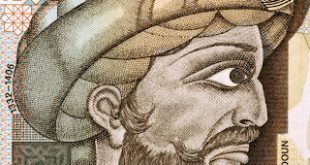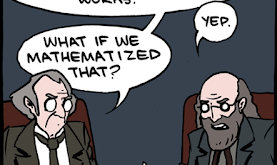Long ago I wrote on the meaning of heterodox economics. I suggested that it should be defined in its own terms, not as a reaction to the mainstream or orthodox approach, and as a unified set of propositions.[1] In other words, heterodox economics would be a set of principles that would be backed by a certain community. Of course, the sociology of that community would lead to some degree of debate and dissent within heterodoxy, as it is in fact the case within the mainstream. There is, one...
Read More »Economics without Gaps: on Ibn Khaldun and non-Western traditions in the history of ideas
Ibn Khaldun, Arab scholarA piece* from a few years ago, has again become somewhat popular and it has been making the rounds. It suggests that the Arab scholar Ibn Khaldun developed the ideas of classical political economics in the late XIV century, about half a millennia before Adam Smith, often seen as the father of classical economics, and of modern economics. Some would suggest that Khaldun was the real father of economics (or stepfather in the first essay on top). To a great extent, the...
Read More »REVIEW ESSAY–The Reformation in Economics: A Deconstruction and Reconstruction of Economic Theory by Philip Pilkington Marc Morgan
Book review.American Affairs REVIEW ESSAY–The Reformation in Economics: A Deconstruction and Reconstruction of Economic Theory by Philip Pilkington Marc Morgan | research economist at the World Inequality Lab of the Paris School of Economics.
Read More »Why do we need a theory of value?
The theory of value and distribution is at the heart of economics. To be clear, when I say that it is at the center, it means that discussions of almost any topic in economics, in one way or another, depend on a certain theoretical position about the theory of value and distribution. However, most economists have no clue about it, about the centrality of value. Not only they don't understand the original and now infamous labor theory of value (LTV), that dominated between Petty and Ricardo...
Read More »On Karl Polanyi and the labor theory of value
The other great transformation I have discussed Polanyi on the blog before, but not in great detail (see this video posted a few years back from Fred Block for a more in depth discussion). However, writing about Bob Heilbroner's views of economics, and in particular the labor theory of value, reminded me why I have reservations about Polanyi, something that often surprises my friends, since I often cite some of his ideas, and I did put his book on the Top 10 list.Polanyi has been,...
Read More »LarsP. Syll — Mainstream theories of income distribution
Increasing asymmetry of income and wealth, which now goes by the name "inequality" as the buzzword, arises either from the function of perfect markets or from asymmetry of power. A perfect market is one in which there is no asymmetry, that is, the agents are homogenous.A perfect market could generate asymmetry through difference in ability that lead to differences in distribution owing based on merit and just deserts (as conventional economics assumes). However, perfect markets don't exist...
Read More »Peter Taaff — Parasitic capitalism exposed [Book Review]
Mariana Mazzucato’s new book is a detailed exposé of the parasitic character of modern capitalism, drawing on Karl Marx’s theory of the source of value creation. But understanding the law of value is only a first step to providing an alternative to a system that cannot overcome its inevitable tendency for periodic crises and which needs to be overthrown, argues Peter Taaffe. Socialism TodayParasitic capitalism exposed Peter Taaff | general secretary of the Socialist Party of England and...
Read More »Nature — How to retool our concept of value – Mariana Mazzucato
Must-read in full. It's short and to the point.The meaning of "value" is one of the most pertinent questions in economics and political economy. Michael Hudson has been emphasizing this for some time, as have Marxists and Marxian. Consideration of value of other than as price revealed in competitive markets is ruled out in conventional economics by methodological assumptions. What we value and how we value it is one of the most contested, misunderstood and important ideas in economics....
Read More »Philip Pilkington — Utilitarian Economics and the Corruption of Conservatism
Weekend reading on economic and political economy. Phil always has interesting things to say as a philosophical economist or economic philosopher.American AffairsUtilitarian Economics and the Corruption of ConservatismPhilip Pilkington
Read More » Heterodox
Heterodox


